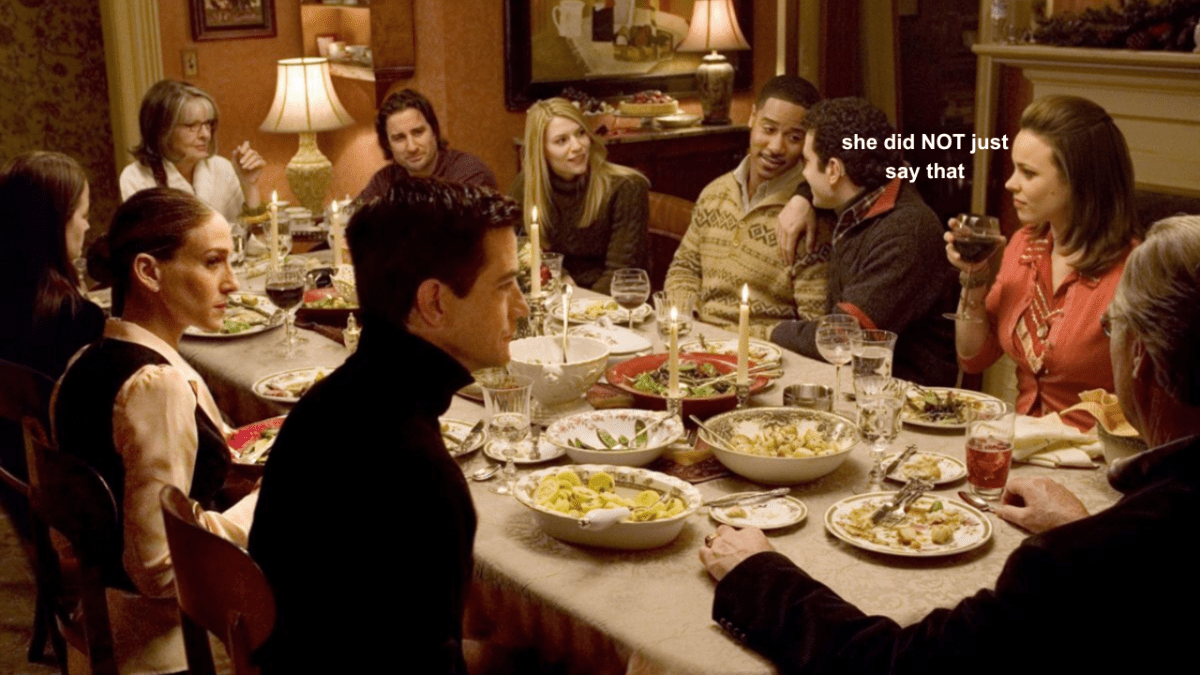
Christmas season is upon us, and that means gifts and yummy food and seeing your loved ones. But it can also mean seeing your… not so loved ones, and that can make things complicated.
While going home for the holidays elicits fun images of frolicking around with your family as you pull apart Christmas bon bons and wear paper hats, it’s not always so simple.
Sometimes our relationships with our family members are strained because of dysfunctional dynamics growing up. Other times, there can be tension because of a difference in values and opinions (I know that’s something I’m dreading this year with seeing my partner’s family, especially given the fraught nature of politics right now post-Voice referendum and amidst Israel’s two-month long bombing campaign against Palestine).
Or maybe things are normally fine with your family, but it’s still *a lot* to spend an entire long weekend with them. Fair enough.
To help you get through what can be a bit of an exhausting time (no matter how excited you are), we spoke to Brooke Smith, a psychologist at Medical on Miami in Queensland, who dropped some sage advice on managing your emotions and mental bandwidth.
Acknowledge your feelings
If you’re feeling nervous about going home for Christmas, Smith said a good place to start is by validating your emotions, because then you can actually work through how to manage them.
“First of all, validate for yourself those feelings of nervousness or validate for yourself that yes, it is a difficult time, and relationships, good, bad or ugly at this time, may be particularly really difficult,” she said.
So it’s really important just to have that elevation and a bit of self compassion to start off with, because then it makes it easier to do the next step.

Set some boundaries for yourself
I know what you’re thinking — set boundaries for yourself? What if you don’t have the type of family who actually respects boundaries (which is how the Christmas drama starts in the first place). But really, this is the advice I found most helpful from Smith, because she’s suggesting that you set boundaries *for what you are willing to deal with*.
Examples of this kind of boundary setting could be having plans already in place for what your day/weekend/week will look like. Some questions you can ask yourself are: How many family members you are going to see? Which ones in particular? How long will you be staying at your parent’s place for? What time will you be leaving?
“Often people will come to me in January and they’ll be really, really, really dysregulated,” Smith told me.
“They would have stayed for two weeks with their family, so then maybe the next year they decide that three days is the limit.”

She suggested that “figuring out for yourself your own boundaries prior to going and allowing yourself to have them” can make stressful situations more bearable.
“Just knowing for yourself like, ‘Okay, it’s only going to be this long, I can do that’, when it’s a little bit more open ended or when it’s too long” can be really helpful, she said.
“If you know that if you stay longer than six hours, people are going to be drunk or somebody’s going to get [into] an argument or you’re going to have, you know, way too much of that sort of black sheep or golden child dynamic and you’ve got to get out of there, you just rein it back in a bit. ‘I’m going to stay for three hours. I can do that’.”
Know what is off-topic beforehand
Speaking of planning in advance, Smith said that if you’re worried about arguments over Christmas dinner with family members, knowing what you’re prepared to get into (and what you’d rather avoid) is a good way to prep yourself.
She advised that you should ask yourself those questions so what “when the topic does come up, you already have that strategy in place”.
“The trick is to know ahead of time where you stand,” she said.
“‘What are my values here? How much do I have in the tank this year? When XYZ gets brought up, how do I want to respond to [it] this year?’
“Once we are triggered, we just react. So we want to be able to know ahead of time: ‘Okay, I would like to respond by just letting that go and leaving the room’, or ‘I would like to respond with like these two phrases that stand by my values and then I’m willing to let it go’, or whatever it is for yourself.”

Prepare some safe topics for when things get awkward
If you’re worried about uncomfortable conversations on Christmas, a good way to try to avoid them could be preparing little conversation starters that you know will veer you into safe territory. That way, you have some control over where the conversation is going.
“Maybe you have nothing in common with your uncle except you both like footy,” Smith said. “Stick to the subjects that you have overlap [with], that you do agree on.”
Have a designated safe person to talk to
Family tension can be easier to deal with if you have someone in your corner who you know you can talk about it with afterwards. This could be your friend or a partner, or it could even be a sibling who you know will make meaningful eye contact with you every time mum makes yet another comment on your job/relationship status/outfit.
“Have a safe person, or a friend, or chosen family that you know you’re going to debrief with afterwards,” Smith advised, because when you know you have “something coming up that you don’t feel nervous about afterwards”, it can act as a “buffer”.

This might not have been Smith’s attention, but a little game I like to play which coincidentally aligns with this advice is that when someone says something particularly cooked or upsetting at a family gatho, I collect it as a little bit of BTS intel to tell my partner or friends about later.
Suddenly, something wildly offensive has now been muzzled into tea or gossip to chat about later, which a) makes you take it less seriously and b) now means you have something to look forward to later.
Take time out
While writing a previous article about how to cope with moving back in with your parents, one person told me that the bathroom had become her safe space because it was somewhere she could have privacy with zero interruption and collect her thoughts. Turns out this is a psychology-backed mindset.
“It’s really important when you are in the family situation to be mindful about what feelings are coming up for you. If you’re starting to feel a little bit dysregulated (that can mean anxiety or anger or feeling a little bit vulnerable), allow yourself to take timeout,” Smith said.
“Notice those feelings in yourself and then you can just do a quick exit, go to the bathroom, just take five and breathe. Remind yourself that this time of year is temporary. And hanging out at this event is temporary. You will get to go back to your life afterwards.”
And finally, be kind (to both yourself and your family)
As cliché as it sounds, try to keep in mind the good things about your family and why you’re seeing them this Christmas, and also the good things that you like about yourself, too.

“We all have particular dynamics that might play out when we’re all in the same room together. Maybe one of you was the golden child, or black sheep. Even if you’re in your 30s, you walk into a room with your family, and within an hour you feel like an unheard 13-year-old who’s trying to get everybody’s attention,” she said, reading me (and some of you, I’m sure) like an open book.
“Just have compassion for yourself. This happens to everybody, you know, old dynamics just get triggered really quickly. And again, just remember: it’s okay. This one’s temporary. Feed yourself, remind yourself of the things that you do love about yourself and your family.
“Remind yourself that you’re human. We all make mistakes. We all do things that maybe we wouldn’t stand behind at our best. Start there. If there are things that you do need to apologise for, apologise. But if it was, you know, just a really difficult situation and you’re just ending up feeling really low, just [practice] a lot of self compassion. Remind yourself you will get through this.”
Well there you have it folks. I don’t know about you, but I’m feeling far more equipped to deal with family drama than I ever have been in my life. On that note, Merry Christmas (because with this advice, I genuinely think it will be).



